#Mamoru is better
Explore tagged Tumblr posts
Text
youtube
I feel so vindicated right now. After all those fights with Seiya fans and Seiusa shippers over whose better and guess what it turns out that not only have Mamoru and Usagi have been dating for years after Seiya well died but she and Mamoru are happily married so HA!
#bishoujo sailor moon#sailor moon anime#sailor moon#usamamo#mamoru chiba#usagi tsukino#Mamoru is better#Youtube
19 notes
·
View notes
Text
Gouenji & Kidou call Endou a soccer freak is so funny to me because like. Gouenji you were literally the only other person besides Endou who enjoyed that nightmare training center. Kidou not even five minutes before you called him a soccer freak you told him 'whenever I was awake, I thought about soccer.' The call isn't coming from inside the house you three are sleeping in the same soccer-themed bedroom and calling Endou from the same damn phone.
#inazuma 11#ina11#inazuma eleven#endou mamoru#mark evans#gouenji shuuya#axel blaze#kidou yuuto#jude sharp#the two of them acting like they are any less insane than endou is so funny to me#you two are not better you just have like 1 extra braincell#inazuma 11 go#ina11 go#break trio#engoukidou#these three will be the death of me i love them so much#platonic or otherwise theyre literally the best#*holds them gently* youre all so stupid#endou also just going along with the title bc theyre his friends and theyre probably right#id kill for a series of just these three screwing around in highschool making a new soccer club and once again conquering the world with it
214 notes
·
View notes
Text





I like how getting gayer and gayer for Endou heals his soul. Like oh that bitch Kageyama who manipulated and brainwashed me for most of my life came back? Too bad for him I fell in love with the boy he is attempting to murder so if he wants to kill him he has to kill me, his so called "most perfect creation", too
#ENDOU IS HIS SUN BTW#this scene goes so hard like you wouldnt believe#the more i think about it the better it gets#the light coming back to his eyes. him being able to quickly overcome his fear at the mere sight of Endou. heck he astralprojected#Endou's figure into the weird ass mind field he and Kageyama were in#thats love bro. thats what love does to you. to be loved is to be changed#kidou yuuto#endou mamoru#enkidou#inazuma eleven#inazuma 11#ina11#me and the bad bitch i pulled by being brainwashed#enki
91 notes
·
View notes
Text

OH GOD OH FUCK
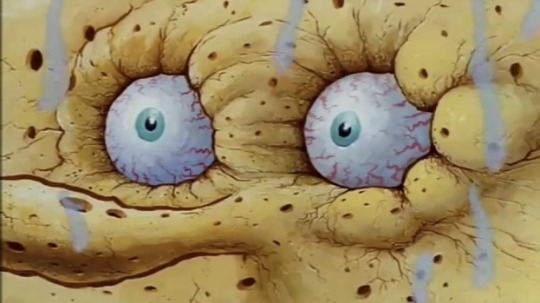
#IM NOT READY#I.. OK I PROMISE I'll START THE NOVEL BEFORE THIS COMES OUT#ORV#AAAAAAAAAAA#THEY BETTER MAKE YJH SEXY AS FUCK!!!!!!!! (he will be no matter what they do it's inherent...#IM NOT READY TO SEE HIM ANIMATED.... DEEP BREATHS. CALM DOWN. I am sane! and normal#sidenote i saw someone's fancast for jp dub and it was actually perfecf???#umehara yuuichirou for yjh#and miyano mamoru for kdj#actually my jaw dropped w how well it fit... esp umehara#i only know him bc my twitter friend likes enstars and happened to hear him but#his voice is so handsome... i think he's 1 of the few jp VAs who could actually do yjh justice#for kr VAs i think there's a lot who can do like a sexy deep voice...#but actually that jp fancast set my expectations too high if they dont cast umehara i'll be sad now KNFND#i think others could fit for dokja but mamoru is definitely a good choice#orv anime
169 notes
·
View notes
Text



My two favorite pairings in a nutshell, or at least very similar to it.
#I love them both more than anything#we don’t talk about how the 90s anime butchered mamoru and usagi- which is one of the reasons why it’s overrated to me honestly#manga sailor moon negs#as for yutamaki I think at times the anime actually did BETTER at portraying the impacts they had on each other#one got done badly by their anime while the other was done better at times lmao#love them either way#anime#manga#jujutsu kaisen#jjk#jujutsu kaisen manga#jjk manga#yutamaki#yuta x maki#pro yutamaki#yuta okkotsu#maki zenin#sailor moon#mamousa#mamoru x usagi#usagi tsukino#mamoru chiba#tuxedo mask#princess serenity#pro mamousa
142 notes
·
View notes
Text

throws this into the enclosure and then disappears in a cloud of smoke
#inazuma 11#inazuma eleven#inazuma eleven go#drawing them with pokemon is like free therapy#their respective starters would be chesnaught empoleon and blaziken btw#does cinderace technically fit gouenji better? yes#but i like blaziken more ok sue me#anyways#gouenji shuuya#endou mamoru#kidou yuuto#axel blaze#jude sharp#mark evans#break trio#engoukidou#normal abt them#my art
59 notes
·
View notes
Text
Won't You Shake A Poor Sinner's Hand?
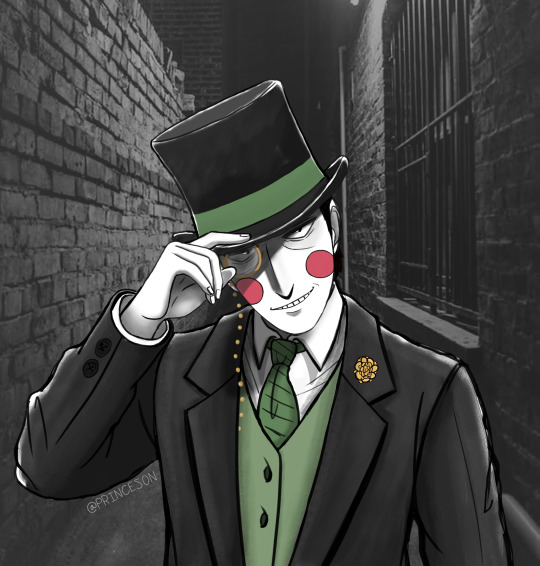
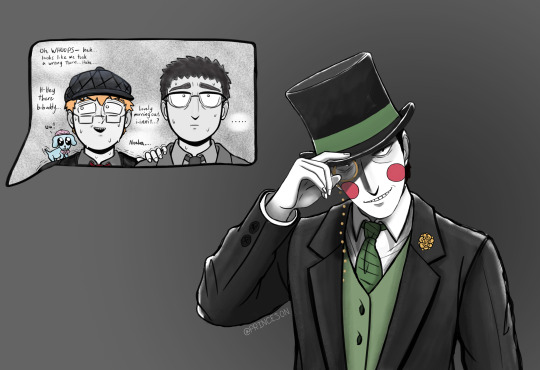
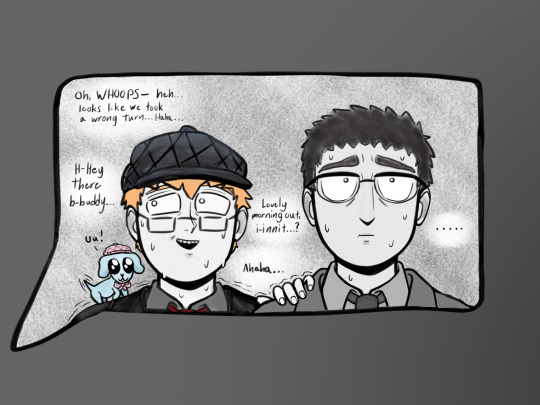
I imagine Reigen and Serizawa were going for a lovely early morning stroll through London and on their way home Reigen offered they try taking a shortcut through a very suspicious foreboding looking alleyway and ended up running into this equally suspicious foreboding looking man, Dimple, who greeted them like the Shadow Man from Princess and The Frog and sang Friends From the Other Side -- or maybe he tried selling them sketchy multi-purpose tonics or used watches or whatever -- Anyway, Reigen's frantic rambling is not helping the situation AT ALL and Serizawa is just standing there nervously, eyes wildy darting back and forth between Reigen and Dimple until he starts silently and anxiously eyeing Reigen and shaking his head hoping Reigen would stop digging his own grave by interacting with this mysterious (and possibly dangerous?) man and, for the love of Mob, just get the heck outta of there lol
Dimple Friday #19
#man I'm fucking beat!!#i spent way too long on this however by the end i only managed to make it a sketchy piece#i just didn't have enough time to do full clean lineart 😔#also I was so tired and burntout i dont think i could've if i tried#jsyk i really put all my effort into this piece and I'm glad i can tell it's definitely a huge improvement in my art#like compared to my other yoshiokas and just other art in general it's improved#even tho it's still a sketchy piece i'm getting better woohoo 🥳 I'm so proud of myself and am really grateful i started doing dimple friday#yes reigen and uu-chan have matching hats because i said so#dimple friday#mob psycho 100#mp100#mob psycho#mob psycho 100 fanart#mp100 fanart#ekubo#dimple#mp100 ekubo#ekubo mp100#mp100 dimple#dimple mp100#serizawa katsuya#reigen arataka#yoshioka dimple#yoshioka mamoru#human dimple#my art#serirei#ekuserirei
81 notes
·
View notes
Text
To Those Left Behind: Answering the anger of the survivors in My Hero Academia vs. Hosoda Mamoru’s Belle
Yes, it's another "What [X] Did Right That BNHA Is Doing Wrong" post. I'm not trying to make this a series, but what's a girl to do when everywhere she looks, she sees other stories that are handling elements of BNHA's endgame with far more grace and rigor? Hit the jump.
The Formula: The Hero vs. The Critic
A bugbear of mine in superhero fiction is when The Hero is presented with someone critiquing their heroism who immediately revokes their objections when The Hero saves them in turn. The basic shape of the story is as follows:
The Hero is confronted by The Critic in some situation that lacks immediate danger. The Critic has issues with The Hero’s day-saving activities. Perhaps in some earlier battle between The Hero and Some Villain, The Critic suffered property damage; they might also be an innocent bystander (or relative thereof) who was harmed in the fight. They might simply be a stickler for laws The Hero may or may not be acting in accordance with. Perhaps they even take issue with the suffering Heroes themselves endure, though in the case of this specific storyline, they’re more likely to be thinking of a different Hero in their lives than the one they’re actually confronting.[1]
The Critic presents an obstacle to the combat-focused method that is superhero fiction’s default mode of conflict resolution. They may endanger The Hero’s activities by threatening legal/institutional reprisal, or they may just be there to make The Hero feel bad about themselves. The Critic may be framed very sympathetically by the story, or they might simply be a buzzkill, but regardless of the degree of empathy the story chooses to afford them, they are a hurdle to be overcome.
The Hero is unable to cogently argue for their own position because superhero narratives are not about offering real life justifications for vigilantism. Rather, because the default mode of conflict resolution in a superhero story is being a superhero, the story circumvents The Critic’s objections by placing them in danger, offering The Hero a chance to save them.
Having thus been personally saved by The Hero (or, to put it more cynically, having personally benefitted from what The Hero does), The Critic promptly gets over all of their objections, even the ones that seemed to have been founded in well-considered ethical frameworks rather than traumatic experiences.
1: “Hero’s civilian loved one has a problem with their heroics” is a whole different story! Typically that story is used to mine for drama in The Hero’s personal life; if it’s not there to serve as an ongoing relationship stressor, it’s more likely that the civilian loved one will get over their objections as a result of seeing The Hero save an uninvolved innocent than because they are themselves directly saved by The Hero.
This, to me, is simple sophistry. “You say you don’t approve of what my saving people costs, but what if I saved you, huh? Then would you like me?” is a cheap gotcha that relies on The Critic being incapable of separating rational ethics from their direct experience. That’s not to say that ethics shouldn’t have a foundation in lived experience, of course, but one also can’t de facto rely on one’s emotional responses to dangerous, traumatic situations to guide e.g. public policy. Emotional responses are not inherently fair; they can be myopic or prejudicial. For the same reasons of impaired partiality that guide judicial recusal or juror screening, a single personal experience with being saved by a superhero cannot be assumed to write superheroes a blank check for everything they do while in costume.
And yeah, I realize that I’m being ungenerous here. I assume that the storyline above is meant to be read as The Critic lacking sufficient empathy for those The Hero saves and coming to a greater understanding of the terror and desperate need experienced by bystanders when Some Villain attacks. I can understand the general thrust of things!
Still, that story structure does not require The Hero to grow—all they have to do is endure and keep doing what they’ve been doing all along. All the growth is experienced by The Critic as they’re led to empathize, not with The Hero, but rather with the other underdeveloped side characters—or more likely bit characters!—The Hero saves. And even that empathy is usually less spotlighted than The Critic’s gratitude, which can feel especially distasteful when it feels like the story is emphasizing how noble The Hero is for saving this jackass Critic that’s been giving them so many problems, and isn’t The Critic just so thankful now that they’ve been humbled and shown the error of their ways?
It’s not a story that, to my eye, usefully challenges The Hero or The Critic, merely a self-serving narrative that assures both The Hero and the audience that The Hero Was Right All Along. I can see the appeal of the “No, you move,” flat arc as much as the next person, but that story just feels like, if you’ll forgive my crudity, setting The Hero up for easily-earned asspats.
Let’s look at some different permutations of the formula as it appears in My Hero Academia.
The Critics of My Hero Academia
Over the course of its 400+ chapters, My Hero Academia portrays a lot of criticism of the state-sponsored Pro Hero industry the story depicts. There are people who criticize the laws that form the basis of professional heroics, people who think Heroes work too hard, people who think Heroes don’t work hard enough, people who think Heroes are too commercial, people who think Heroes are a shiny façade over a corrupt and ugly reality, people whose way of life has been ruined by the rise of Heroes, and on and on.
Unfailingly (and often to its considerable detriment), the flawed but valiant Heroes of My Hero Academia continue to uphold their system and their activities as valuable, admirable, and—most crucially—the only reasonable solution to the problems created by the superpowers wielded by the setting’s inhabitants. Any Critics they face are destined to be proven wrong; neither the Heroes nor the author have any real desire to explore meaningful alternatives to the Hero System. Many of its Critics are thus presented as cynics operating in bad faith or outright Villains who only resent the Hero System because it makes their criminal activities harder!
However, there are Critics who are treated as more valid by the narrative: those whose objections to Heroism are rooted in the family bonds and/or love and care they hold for specific Heroes. It’s this type of Critic—and MHA’s response to them—that I want to look at in more detail.
> Case 1: Izumi Kouta
Kouta is the single most clear-cut example of the “The Hero saves and thus convinces The Critic” narrative the series has to offer, as well as foreshadowing much more extreme damage in other characters the audience will meet later on. An orphaned child whose parents died in combat with Some Villain, Kouta has grown resentful of Heroes and surly towards the society that worships them. He doesn’t understand why a bunch of strangers were so important that his parents would choose to prioritize those strangers over their lives with him. Deku The Hero has no idea how to address this, and therefore roundly fails in his first few attempts to verbally engage with Kouta.
It’s not until Some Villain[2] shows up to menace Kouta with the threat of gruesome murder that Deku’s able to connect with him. Note how this scenario puts Deku back in his comfortable heroic wheelhouse. Sure, he breaks a bunch of bones in the process of fighting Muscular, and it hurts a whole lot, but beating Muscular does not require Deku to triumph in an ideological battle; he simply has to be the best at Punching Really Hard. It’s quite straightforward and simple by comparison!
[2] As it happens, the same one who killed Kouta’s parents, but that’s an incidental detail; the narrative would have gone the same way with any Villain who was willing to threaten the life of an uninvolved child. My Hero Academia simply has a surprisingly low number of Villains who fit that criteria.
Does being the best at Punching Really Hard actually address Kouta’s ideological problem with his parents choosing Heroism over being with him? Well, no. Kouta simply pivots into idolizing Deku and never brings up his parents or his trauma surrounding their deaths again. Having come to understand how much it means to be Saved, Kouta gains a new appreciation for the value of Those Who Save, but this valuation is entirely focused on the Hero who saved him, without resolving the question of why said Hero is valuing the life of some stranger over his own familial bonds—and whether it’s correct for The Hero to do so!
My Hero Academia simply doesn’t care about Kouta as anything other than a vehicle for allowing Deku to feel confident and proud in his chosen career, and thus its portrayal of Kouta as Convinced Critic fails to escape the clang of intellectual dishonesty so frequently present in narratives of the type.
Sidebar—The Case of The Critic as Family: Midoriya Inko Inko’s opinions on Deku’s heroics present an obstacle twice, with the former instance being much more compelling. Her confrontation with All Might is much closer to the “Hero’s civilian loved one has a problem with their heroics” story I mentioned previously in a footnote, but with a major shift that pushes her closer to The Critic’s role: Deku’s age. If Deku were an adult, Inko’s objections would simply be fodder for relationship drama, but him being a minor means Inko has a degree of parental authority she’s capable of wielding in his life—over his objections, should she choose! This allows her to pose a very direct threat to his further ability to engage in heroics. In the end, however, the obstacle is resolved in mostly the standard way of the loved one objector. Deku’s prior rescue of Kouta—and the fan letter Kouta sent him as a result—is used to prove firstly the value to others of Deku’s Heroism and secondly the personal fulfillment Deku derives therefrom, leading Inko to back down after making both Deku and All Might promise to be more mindful of their lives when facing danger. Both will go on to disregard this promise almost entirely, of course, but by the time Inko’s objections resurface post-Jakku, their potential impact has been firmly diminished: Deku has gained resolution and power such that nothing Inko could say would stop him from leaving, and so her objections no longer pose a meaningful threat to his heroism. Indeed, her role is so diminished that said objections don’t even rise up to the level of a relationship stressor or something to make The Hero feel bad about himself—she’d have to actually interact with Deku or be present in his thoughts for either of those to be the case, and, post-hospital, the story allows her neither.
> Case 2: Shimura Kotarou
“Heroes hurt their own families just to help complete strangers.” Kotarou is a man who sees himself as having been abandoned by his mother in favor of Heroism. Even though she left him a letter about how he was in danger because of a “bad man” she had to go and fight, even though he almost certainly knows that battle took her life, he blames her for his horribly traumatic abandonment. His grudge likely goes even further, too: given both the woeful shortcomings of Japan’s alternative childcare system[3] and his own personality as an adult, I would be shocked if Kotarou’s subsequent upbringing wasmarked more often by joy and belonging than by pain and alienation.
3: Which, I note, has not been so improved in the rosy glow of the heroic future that a monster like Ujiko was unable to get a foothold in it.
In Kotarou’s eyes, even if Some Villain was endangering him, that was only happening because his mother was a Hero to begin with. If she hadn’t chosen that career, made that enemy, Kotarou would still have both parents, and he wouldn’t have grown up in an almost certainly overcrowded children’s home with the deep societal stigma of being an "orphan “unwanted child” knotted around his neck.
Unlike the other examples of this type of Critic in the story, Kotarou’s bitterness is never assuaged. Instead, down to their strikingly similar names,[4] he serves to illustrate a possible dark ending of how Kouta’s life might have gone if a Hero had never (oh-so-Heroically) gotten him through his wrongheaded (per the narrative) stint as a Critic. And though Kotarou’s life was ended as a direct result of that resentment, it also outlives him, winding itself into the deepest roots of his son’s equally venomous opinion on Heroes.
4: A disclaimer: Their names are less immediately similar in the Japanese, where Kou and Ko are given entirely different kanji (洸 and 弧 respectively). The ta parts of their names, while also using different kanji, do have a base radical in common: 汰 and 太 both include the 大 radical. That's certainly close enough for wordplay jokes to make sense, even if they're not as close as the official rendering of the names (Kotaro and Kota) makes them look.
> Case 3: Shigaraki Tomura
Shigaraki is MHA’s other key invocation of the Hero vs. Critic narrative, though his permutation is quite different from the norm by virtue of the fact that he is also a Villain. While his own critique of Hero Society is in the “shiny façade covering its true ugliness” camp, Shigaraki also adopts his father’s beliefs as his own, echoing Kotarou’s definition of a Hero at Jakku. Notably, this was part of a speech delivered to a bunch of Heroes who, seeing as they themselves were the danger he was facing at the time, were considerably less nobly determined than usual to Save The Critic!
At the time, Deku had neither an answer to Shigaraki’s accusation nor even the willingness to grapple with it. As of this writing, while he’s much more invested in understanding Shigaraki’s pain, but he still lacks an answer to the root causes of it. It remains to be seen what exactly he’ll come up with, but at current, he remains stoutly determined to treat Shigaraki as nothing more than a shell over the Crying Boy that Deku believes remains at Shigaraki’s core. This is none too promising in terms of doing anything to challenge the standard Hero vs Critic narrative! The premise that Deku will save Shigaraki functionally demands that that “saving” (whatever form it winds up taking) will in and of itself end the opposition Shigaraki currently poses.
The Critic obstructs The Hero. The Hero saves The Critic. The Critic no longer obstructs The Hero.
And then The Hero goes on being the main character, while The Critic passes without protest into the rearview mirror as The Hero’s story moves on.
Let’s take a look at a story that dares to try something different with that over-familiar narrative.
Hosoda Mamoru’s Belle
Naito Suzu is a girl who lost her mother to Heroism, and Suzu has never forgiven her for it.
Immediately, the change of focus electrifies. The main character of Belle is not a Hero who must prove herself to a Critic; she is The Critic!
Or is she…?
To get a bit more detailed, when Suzu was a child, no more than six years old, her mother strapped on a lifejacket and, over Suzu’s protestations and pleas, waded into floodwaters to save a stranded child. The child, put into that same lifejacket, was pulled out of the river by other bystanders. Suzu’s mother was not. In the young Suzu’s eyes, her mother gave up their life together to save some stranger.
Over a decade later, Suzu still hasn’t come to terms with that. She loves music—a pastime her mother encouraged—but now its association with her mother means that Suzu can’t sing without feeling a visceral nausea that leaves her retching and shaking with all that unprocessed fury, grief, and frustration. She’s introverted at school, with only two close friends, and her relationship with her father is distant and awkward.
This is the state of affairs when one of Suzu’s friends ropes her into trying U, a bonkers virtual reality playground/social media platform/fantastical internet-alike that’s taken the world by storm. In U, hiding behind a digital avatar with the face of a Disney princess,[5] Suzu finds that she can sing without being wracked with panic and distress. Before long, and with her savvy friend’s help, “Belle” is a full-on internet sensation, giving virtual concerts watched by millions. It’s when one of those concerts is crashed by a mysterious and much-maligned user called the Dragon that the real plot kicks in.
5: Literally; Suzu’s online avatar was designed by Jin Kim, a longtime Disney animator and character designer.
It’s from that point on that Suzu begins to shift. Recognizing in the Dragon a fellow wounded soul, she’s drawn to find out more about him. When a real-life crisis of the ugliest kind finds him, she risks everything she and her friend have built so that she can find and save the boy behind the Dragon—a boy she has never met. It’s only after Suzu has made that leap—when she is staring into the void, not yet knowing how she’ll land—that she has the epiphany: This is what her mother felt. This is why her mother acted as she did.
The movie still has some places to go in seeing Suzu’s gamble through—saving the Dragon is a major plot element!—but the other main plot element, the story of how Suzu reconciles and finds closure with her mother’s death, climaxes there in that moment of truth. Whatever else there is to say about the film’s perhaps overly faith-driven resolution of Dragon’s plot (and there is, to be sure, a lot to say), its resolution to Suzu’s positioning as The Critic in regards to the actions of her Hero mother is a perfectly elegant, sublime solution to the problem, convincing me of The Critic’s turn in a way no other story ever has.
In My Hero Academia, as in so many other traditional superhero properties, Critics are present as obstacles for the Heroes to overcome. The story does not care if those Critics understand the Heroes themselves; it merely wants them to accede that the Hero is right and they are wrong. It puts problems in their path that it insists only The Hero can solve and thus browbeats Critics into acceptance.[6] Far from presenting any alternate paths for The Critics and The Heroes to come to an accord, the story uses the specter of gruesome death—Kotarou’s death at the hands of the son his anti-Hero stance led him to abuse; Muscular’s gleefully murderous rampage—to leave Critics with no other choice: Validate Heroes or die. And the audience is, very clearly, intended to read this blatant false binary as intellectually honest and emotionally rewarding.
6: This pattern becomes even more egregious if you expand the lens from Critics who are grappling with the actions of Heroic family members out to the more traditional Critics whose issues resolve around collateral damage. Look at the scornful holdouts Shindo and Tatami encounter, for example, or the angry journalist woman whose mother was hurt in Gigantomachia’s rampage, both of whom recant their skepticism after witnessing the scale of the threats Heroes face. You see echoes of the pattern in the final arc as well, wherein Endeavor’s fanboy comes back around on Endeavor as a prelude for skeptics all around the globe being moved to prayer by All Might’s grotesque battle against All For One.
In Belle, on the other hand, The Critic is not overcome by being saved themselves. Indeed, while Suzu is saved at one point (some of Dragon’s AI creations help her escape from U’s peacekeeping force, a group as self-righteous as they are self-appointed), not for one instant does that experience cause her to mentally align herself with the feelings of the child her mother saved. Rather, the story puts Suzu in a situation where she must save another. Thus, she reconciles with The Hero not because the plot corners her into becoming a Victim in need of help, but because her own actions bring her to a place of true empathy. She validates The Hero’s past actions because, in her own moment of crisis, The Critic herself becomes The Hero.
Would that superhero stories like My Hero Academia could treat its Critics with even a fraction of Belle’s respect for Suzu’s interiority and agency.
#bnha#the dragon and the freckled princess#mamoru hosoda's belle#bnha critical#my writing#continuing my dubious drawing of parallels between vastly different genres of story#next time: why laios dungeon meshi is a better nerd main character than deku academia#(probably not really but I just want you all to know that if I wrote it I would be right about it)
61 notes
·
View notes
Text

beauties.png
#one piece#sanji#we watched baron omatsuri and strong world while me and my brother were on vacation#so y'all are about to see a lot of screenshots from those 2 movies#I think overall I liked strong world a little better but I reeeeeally loved the animation in baron#mamoru hosoda is one of my favourite directors and he did not disappoint in the style department
47 notes
·
View notes
Photo

the Utena creative team:

#yeah they clearly dont understand anything#i actually dunno if mamoru nagano was involved but i couldnt find a better picture so this is what u get#rgu#shiv.txt
245 notes
·
View notes
Text

happy last day of pride month :3
#infiniteshipping#jougo#haou#mamoru#crystal protector#yugioh gx#angel's art#i just wanted to do this because i have rainbow sunglasses and also i thought it would be funny lol#i was going to make the glasses pan flag colors for jougo but the rainbow looked better#anyway happy pride yall!
12 notes
·
View notes
Photo

Senshi x Family
(Sailor Moon AU)
☾ ♡ ☽ ☾ ♡ ☽ ☾ ♡ ☽
A gentleman thief.
A magical soldier for love and justice.
And their daughter from the future.
To find the Legendary Silver Crystal to defeat the Dark Kingdom, they form an unlikely family.
Rumours suggest that the Silver Crystal is hid away in Princess D's treasury, part of a collection so rare and priceless hardly anyone has ever seen it. The princess itself lives an elusive life, except for the yearly ball at her academy for the young and gifted and their parents.
If only Chiba Mamoru had a child and wife in order to infiltrate the academy. So when a rabbit-haired girl falls from the sky, he doesn't question his stroke of luck. And when he crosses path with a certain "odango atama" from his youth, it seems like he is set for a perfect pretend-family.
Except when his wife is Sailor Moon and his fake daughter is theirs from the future, chaos ensues.
#sailor moon#spy x family#tsukino usagi#chiba mamoru#chibi-usa#usamamo#i watched/read spy x family#my first anime in years and it was a lot of fun#but then this sailor moon au popped into my head#and i think it would be so much fun#mamoru who is pretty much a dad the moment he stumbles over chibi-usa#then he crosses paths with usagi after coming back from america#and they form a family while pretending it's just a means to and end#in order to hide their secret identities better and get invited to princess d's ball#remember the ball and the fake silver crystal in sailor moon?#so there would also be the dark kingdom#and chibi-usa would be from the future and she would know she's their daughter like in the manga#and try her hand at match-making#really i think it would be fun and cute#but as cute as the idea is ... honestly the picture! the picture took me so long and even now I don't think it turned out well#but I just couldn't continue working on it anymore#still I hope some people enjoy this silly little au idea#:D
123 notes
·
View notes
Text
Kind of a rant
In Japan, being a public disturbance is reallyyyy frowned upon and if someone is, it's pretty common that a stranger will scold them. Usagi and Mamoru's dynamic in the first season gets misunderstood, because that sort of thing doesn't really exist in the US. Usagi's primary setting is "public disturbance" and Mamoru coincidentally keeps being the person who scolds her. Americans just see it as bullying because the idea of a stranger scolding you (for something *you* did wrong) is foreign to them. The US is individualist but Japan is collectivist, so there's more accountability for bad public etiquette.
people are just constantly like "why is he bullying her😢😢" during scenes where usagi is breaking like 5 massive social rules at once. for context, some japanese social rules that will get you scolded if broken would be: yelling, talking loudly, sitting on the ground, crawling, throwing things (duh), running, bumping into people, and eating while walking (you could run into someone).
when mamoru makes fun of her for "stuffing her face" or something, he's not criticizing her for eating, he's criticizing her for eating while walking.
basically, the concept is "what if the person who is rude in public and the person who scolds them ended up being in love haha". it's really not that deep, like it's just silly. usagi ignores basic social rules, and then acts dense when she's being scolded, so the five year olds at home can be like "haha that's so silly. also i shouldn't eat my candy while walking so i don't run into people like she does".
these interactions are a comedic way to teach young children everyday etiquette, basically. and mamoru's scolding being completely ineffective and making the issue worse adds to the comedy
(i do think gently explaining to her that she's bothering others is what would get through to her, but that's not very funny and would be really anticlimactic so.. also her character arc is literally about being less self centered and taking others into account more, like these fights are thematically important too.)
#I FEEL LIKE THIS IS AN OBVIOUS THING TO EXPLAIN BUT PEOPLE REALLY DON'T GET IT..😭😭😭#if he's “bullying” her that means she's completely innocent like..#is throwing your shoes around in a crowded area safe behavior??#SHE LITERS TOO WHICH IS SUCH A NO NO AND EVERYONE IGNORES IT..#she pesters public service workers#she is such a mess and people are like “lalala i don't see it”#it's actually miraculous she doesn't get scolded more#mamoru doesn't scold her because he wants her to suffer or something#it's because he feels responsible when she does something wrong and wants her to do better#do you have to agree with it? no#is it a social norm? yes#is it bullying? no#does usagi pretend it's bullying to wriggle out of being accountable? yes#does scolding work? not on usagi#is it essential to the story? YES#sailor moon#tsukino usagi#usagi tsukino#mamoru chiba#chiba mamoru#rant
115 notes
·
View notes
Text
I miss ibumamo. I hope they're enjoying domestic life together as two dads who flirt a lot in public and raise a child who was once an old man set on rewriting the fabric of reality before he got turned into a baby through a series of very bizarre events.
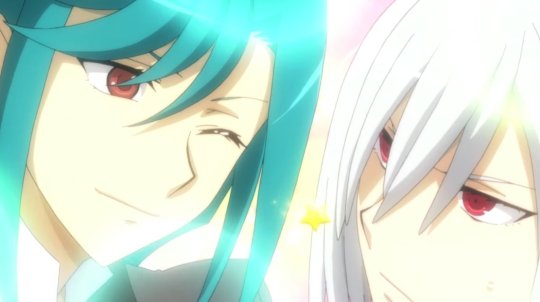
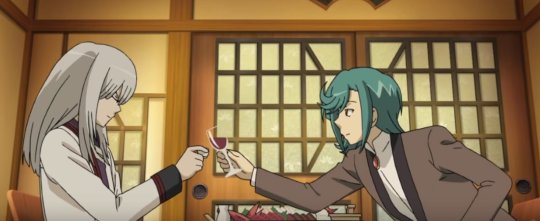
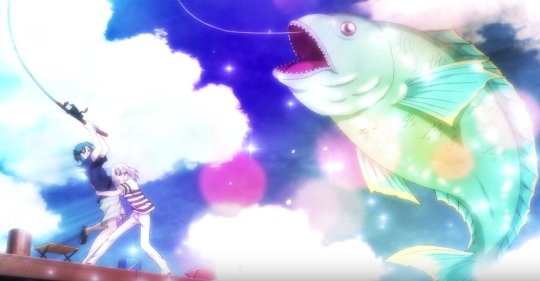
#i'm not tagging this#i truly believe the two people on this earth who are meant to see this will see it. god willing.#i dont know who those two people are but they exist im sure#anyway im wildly depressed today so thinking about my husband mamoru and his boyfriend ibuki makes me feel better
23 notes
·
View notes
Text
Me to every man I see: you will never be mamoru chiba
21 notes
·
View notes
Text
Holy shit! Maka & CRONA'S VAs??!!!

#my ramblings#I mean I know it's kinda expected that Maka & Soul's VAs return to voice a promo for this 20th anniversary exhibition thing-#-but I never really expected Crona's VA to come back and take part on this promo thing. it's such a treat! I was maybe expecting Kid's VA-#-cuz afaik Mamoru(Kid's VA) is still active in the voice acting career plus Kid is part of the main cast#don't get me wrong. I TOTALLY LOVE hearing Crona's voice again and it was such a pleasant surprise. it's just... idk well unexpected for a-#-minor character (later 'villain') to be the 1st one to make a come back voice alongside with the protagonist instead of one of the main-#-party Maka teamed up with like Kid or Black Star#what does this mean#well.. maybeee?? Kid along with the Thompson sisters and Black Star along with Tsubaki will have their own part in promoting this later on#assuming their VAs would also make a come back#so lack for a better reason they partnered up Maka & Crona for this promo taking account of what happened in the manga and how meaningful-#-their bond is to the story. sooo... safe to assume CROMAKA CANON!!!#lmao my brain is so fried im sorry#this doesn't makes sense. I'm literally just rambling#tho I wish I knew what they were saying...I heard Crona's VA saying 'big chance of (something) is going to be held'#and Maka saying 'Ohkubo-sensei (something something) special video' lol that's as far as my limited JP can understand#I wish there was a transcript or a translation of they said (っ˘̩╭╮˘̩)っ
8 notes
·
View notes